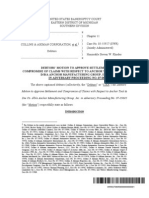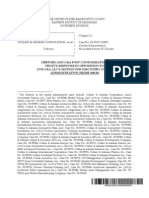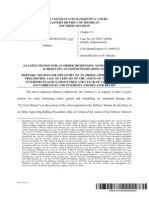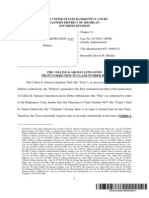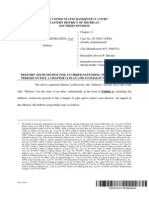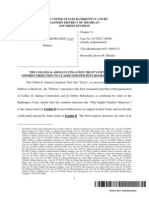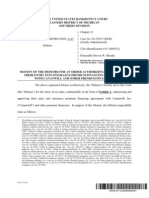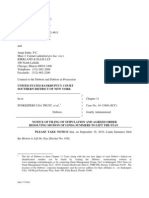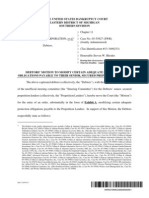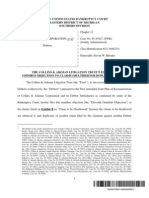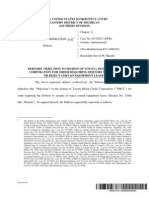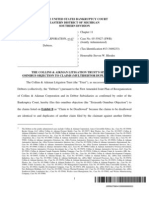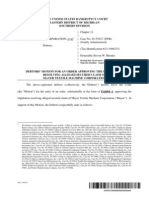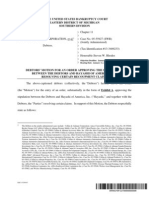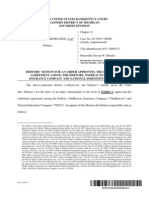Answer of Jason, Inc. and Pioneer Automotive Technologies, Inc. To Debtors' Motion For An Order Deeming Reclamation Claims To Be General Unsecured Claims Against The Debtors and Related Relief
Answer of Jason, Inc. and Pioneer Automotive Technologies, Inc. To Debtors' Motion For An Order Deeming Reclamation Claims To Be General Unsecured Claims Against The Debtors and Related Relief
Uploaded by
Chapter 11 DocketsCopyright:
Available Formats
Answer of Jason, Inc. and Pioneer Automotive Technologies, Inc. To Debtors' Motion For An Order Deeming Reclamation Claims To Be General Unsecured Claims Against The Debtors and Related Relief
Answer of Jason, Inc. and Pioneer Automotive Technologies, Inc. To Debtors' Motion For An Order Deeming Reclamation Claims To Be General Unsecured Claims Against The Debtors and Related Relief
Uploaded by
Chapter 11 DocketsOriginal Title
Copyright
Available Formats
Share this document
Did you find this document useful?
Is this content inappropriate?
Copyright:
Available Formats
Answer of Jason, Inc. and Pioneer Automotive Technologies, Inc. To Debtors' Motion For An Order Deeming Reclamation Claims To Be General Unsecured Claims Against The Debtors and Related Relief
Answer of Jason, Inc. and Pioneer Automotive Technologies, Inc. To Debtors' Motion For An Order Deeming Reclamation Claims To Be General Unsecured Claims Against The Debtors and Related Relief
Uploaded by
Chapter 11 DocketsCopyright:
Available Formats
UNITED STATES BANKRUPTCY COURT EASTERN DISTRICT OF MICHIGAN SOUTHERN DIVISION ----------------------------------------------------------In re: x ) ) 1 ) COLLINS & AIKMAN CORPORATION,
et al. ) Debtors. ) ) ----------------------------------------------------------- x
Chapter 11 Case No. 05-55927 (SWR) (Jointly Administered) Honorable Steven W. Rhodes
ANSWER OF JASON, INC. AND PIONEER AUTOMOTIVE TECHNOLOGIES, INC. TO DEBTORS MOTION FOR AN ORDER DEEMING RECLAMATION CLAIMS TO BE GENERAL UNSECURED CLAIMS AGAINST THE DEBTORS AND RELATED RELIEF
Jason, Inc. (Jason) and Pioneer Automotive Technologies, Inc. (Pioneer)2 each state:
The Debtors in the jointly administered cases include: Collins & Aikman Corporation; Amco Convertible Fabrics, Inc., Case No. 05-55949; Becker Group, LLC (d/b/a/ Collins & Aikman Premier Mold), Case No. 05-55977; Brut Plastics, Inc., Case No. 05-55957; Collins & Aikman (Gibraltar) Limited, Case No. 05-55989; Collins & Aikman Accessory Mats, Inc. (f/k/a the Akro Corporation), Case No. 05-55952; Collins & Aikman Asset Services, Inc., Case No. 05-55959; Collins & Aikman Automotive (Argentina), Inc. (f/k/a Textron Automotive (Argentina), Inc.), Case No. 05-55965; Collins & Aikman Automotive (Asia), Inc. (f/k/a Textron Automotive (Asia), Inc.), Case No. 0555991; Collins & Aikman Automotive Exteriors, Inc. (f/k/a Textron Automotive Exteriors, Inc.), Case No. 05-55958; Collins & Aikman Automotive Interiors, Inc. (f/k/a Textron Automotive Interiors, Inc.), Case No. 05-55956; Collins & Aikman Automotive International, Inc., Case No. 05-55980; Collins & Aikman Automotive International Services, Inc. (f/k/a Textron Automotive International Services, Inc.), Case No. 05-55985; Collins & Aikman Automotive Mats, LLC, Case No. 05-55969; Collins & Aikman Automotive Overseas Investment, Inc. (f/k/a Textron Automotive Overseas Investment, Inc.), Case No. 05-55978; Collins & Aikman Automotive Services, LLC, Case No. 05-55981; Collins & Aikman Canada Domestic Holding Company, Case No. 05-55930; Collins & Aikman Carpet & Acoustics (MI), Inc., Case No. 05-55982; Collins & Aikman Carpet & Acoustics (TN), Inc., Case No. 05-55984; Collins & Aikman Development Company, Case No. 05-55943; Collins & Aikman Europe, Inc., Case No. 05-55971; Collins & Aikman Fabrics, Inc. (d/b/a Joan Automotive Industries, Inc.), Case No. 05-55963; Collins & Aikman Intellimold, Inc. (d/b/a M&C Advanced Processes, Inc.), Case No. 05-55976; Collins & Aikman Interiors, Inc., Case No. 05-55970; Collins & Aikman International Corporation, Case No. 05-55951; Collins & Aikman Plastics, Inc., Case No. 05-55960; Collins & Aikman Products Co., Case No. 05-55932; Collins & Aikman Properties, Inc., Case No. 0555964; Comet Acoustics, Inc., Case No. 05-55972; CW Management Corporation, Case No. 05-55979; Dura Convertible Systems, Inc., Case No. 05-55942; Gamble Development Company, Case No. 05-55974; JPS Automotive, Inc. (d/b/a PACJ, Inc.), Case No. 05-55935; New Baltimore Holdings, LLC, Case No. 05-55992; Owosso Thermal Forming, LLC, Case No. 05-55946; Southwest Laminates, Inc. (d/b/a Southwest Fabric Laminators Inc.), Case No. 05-55948; Wickes Asset Management, Inc., Case No. 05-55962; and Wickes Manufacturing Company, Case No. 05-55968.
2 Aside
from having the same counsel in this case, Jason and Pioneer are not related to each other in any way.
0W[;'"(
0555927070208000000000010
*s
INTRODUCTION AND FACTUAL BACKGROUND: Debtors, Collins & Aikman Corporation, et al. (Debtors) commenced these cases on May 17, 2005 (the Petition Date). One week after the Petition Date, the Debtors filed an Emergency Motion for Order (a) Establishing Procedures for Treatment of Valid Reclamation Claims and (b) Prohibiting Third Parties from Interfering with Delivery of the Debtors Goods (the Reclamation Procedures Motion). On June 9, 2005, the Court entered an Order (the Reclamation Procedures Order) granting the Reclamation Procedures Motion.
The Reclamation Procedures Order provided that (among other things): b. By September 7, 2005, the Debtors shall file and serve (on all parties in interest, including, without limitation, each person who made a reclamation demand a notice (the Reclamation Notice), which shall contain at least the following information: (i) (ii) (iii) (iv) (v) the name of the reclamation claimant; the date on which the applicable Debtor(s) assert the reclamation demand was received; the amount of the reclamation demand; the amount of the reclamation demand which the applicable Debtor(s) believe is valid; and the amount of the reclamation demand which the applicable Debtor(s) believe is invalid, and the basis for such belief.
(emphasis supplied).
The Reclamation Procedures Order also provided that, Except as otherwise set forth herein, nothing in any interim or final financing order, or any other order, shall prejudice the rights of reclamation claimants.
Finally, and directly relevant to todays issue, the Reclamation Procedures Order stated that All parties reserve their rights as to the effect of prepetition liens on otherwise valid reclamation claims.
On September 7, 2005, Debtors filed their Notice of Reclamation Claims the Debtors Deem to be Valid (the Reclamation Notice). Among other things, it stated, PLEASE TAKE FURTHER NOTICE THAT it is the Debtors position that the rights of the reclamation claimants, if any, are subordinate to, and may be extinguished by, the claims of the Debtors prepetition secured lenders. [citations omitted]. Nothing in the Reclamation Notice constitutes a waiver of the Debtors rights or the rights of their prepetition or postpetition secured lenders with respect to reclamation claims, and all such rights are hereby reserved. With respect to Jason (under the name of its division, Janesville-Sackner Group), the Reclamation Notice stated that Jasons entire reclamation claim of $355,755.48 was invalid, primarily because the Debtors asserted that $317,830.82 of the inventory supplied by Jason was no longer in Debtors possession.
With respect to Pioneer, Debtors asserted that its entire claim of $286,847.40 was not valid because the Debtors lacked information.
Both Pioneer and Jason timely objected to the Reclamation Notice, and both Pioneer and Jason spent thousands of dollars on legal fees and internal accounting costs to attempt to quantify their reclamation claims.
Now, on January 9, 2007, slightly more than 16 months after the Reclamation Notice was due, and after Jason, Pioneer, and other claimants have spent thousands of dollars on reclamation issues, Debtors assert that all reclamation claims are invalid, and should be allowed only as general unsecured claims. On January 9, 2007, Debtors filed their Motion for an Order Deeming Reclamation Claims to be General Unsecured Claims Against the Debtors and Related Relief (the Reclamation Disallowance Motion).
In the Reclamation Disallowance Motion, the Debtors state that it is axiomatic that where a reclamation claim has no value under applicable state law, such claim is not entitled to priority under the Bankruptcy Code. The Debtors also rely upon the findings of fact contained in the Final Order (I) Authorizing Debtors (A) to Obtain Post-Petition Financing Pursuant to 11 U.S.C. 105, 361, 362, 364(c)(1), 364(c)(2), 364(c)(3), 364(d)(1) and 364(e) and (B) to Utilize Cash Collateral Pursuant to 11 U.S.C. 363, and (II) Granting Adequate Protection to Prepetition Secured Parties Pursuant to 11 U.S.C. 361, 362, 363, and 364 (the Final DIP Order) to establish the value, validity and priority of the claims of the Prepetition Lenders. Debtors also assert in Paragraph 12(d) of the Reclamation Disallowance Motion that the DIP loans primed reclamation claims.
Finally, the Debtors assert that under their Plan of Liquidation, the Prepetition Lenders will not be paid in full. 22 of the Reclamation Disallowance Motion. They cite a long line of cases that state that reclamation claims lose their priority when either (a) the secured creditors
are not paid in full, or (b) the floating lien on inventory exceeds the value of any particular reclamation claim.
This begs two questions: 1. Why was this issue preserved and not raised back in September 2005. As a result of that decision, creditors spent thousands, and the estate tens of thousands o f dollars, evaluating and contesting the validity (and thus the priority) of reclamation claims? 2. What took so long to raise this issue? While the Debtors assert that it was only in contemplation of their current Plan of Liquidation that they discovered that prepetition secured creditors would not be paid in full, even their prior plan was premised on giving the prepetition secured creditors substantially all of the equity in the Debtors which would not have been confirmable under the best interests of creditors test unless it was clear that, more likely than not, the prepetition secured creditors would not be paid in full.
In any event, the fundamental premises of the Debtors Reclamation Disallowance Motion contradict the Courts prior orders, raise irrelevant facts and are barred by the doctrine of laches. Accordingly, the Reclamation Disallowance Motion should be denied.
ARGUMENT: A. The Findings of Fact Contained in the DIP Order Are Not Relevant, and Do Not Create Any Issue Preclusion Or Law of the Case. In Paragraph 12 of the Reclamation Disallowance Order, the Debtors rely solely on the findings of fact contained in the Final DIP Order to establish the existence, validity, priority and status of the prepetition secured creditors claims against inventory. Without expressly stating it, they assert that the findings of fact contained in the Final DIP Order bind reclamation claimants and prevent any dispute over this issue. In fact, this allegation is incorrect.
The Reclamation Procedures Order entered by this Court expressly stated that: Except as otherwise set forth herein, nothing in any interim or final financing order, or any other order, shall prejudice the rights of reclamation claimants. No provision of the Reclamation Order precluded reclamation claimants from challenging the validity, priority or amount of the prepetition secured creditors claims. Further, no provision of the Reclamation Order made it subordinate to any provision in the Final DIP Order (or any other order) except as to paragraph 22 of the Interim DIP Order (which prevented a reclamation claimant from taking possession of the goods it sought to reclaim).
As far back as 2005, the law of this case provided that the neither the final financing order, nor any other order, could prejudice the rights of reclamation claimants. Thus, the Debtors attempt to use the Final DIP Order to create a law of the case argument fails as a matter of law because the Reclamation Procedures Order specifically stated that (as to
reclamation claimants rights), its terms were superior to not only the final financing order, but to any other order entered in the case.
The Reclamation Procedures Order, not the Final DIP Order, created the law of this case, and it expressly barred the sort of argument made by the Debtors in the Reclamation Disallowance Motion. The Debtors have not established that the prepetition secured
indebtedness is valid, nor have they established its amount.
B. Reclamation Rights Were Not Primed By The Final DIP Order
In paragraph 12(d) of the Reclamation Disallowance Motion, the Debtors assert that reclamation claims were primed by the DIP loans under the Final DIP Order. That might have been true except for the language of the Reclamation Procedures Order.
In that Order, the Court broadly and clearly barred the Debtors ability to prejudice the rights of reclamation claimants.3 Priming a claim particularly without any adequate protection -- in a circumstance where the Debtors are losing hundreds of millions of dollars (as in this case)
3
The Sixth Circuit has considered the similar statutory language contained in Section 1113(f) of the Bankruptcy Code which states no provision of this title shall be construed to permit a trustee to unilaterally terminate or alter any provisions of a collective bargaining agreement prior to compliance with the provisions of this section. In re Unimet Corporation, 842 F.2d 879 (1988) cert. den. sub nom Unimet Corporation v. United Steelworkers of America, AFLCIO-CLC, 488 U.S. 828, 109 S.Ct. 81 (1988)(As discussed above, section 1113 unequivocally prohibits the employer from unilaterally modifying any provision of the collective bargaining agreement.). In this case, the Court unequivocally prohibited any prejudice to the rights of reclamation claimants outside of the four corners of the Reclamation Procedures Order.
is the sine qua non of prejudicing the rights of reclamation claimants. Debtors are not able to point to any express language of the Final DIP Order priming reclamation claimants. Instead, Debtors only assert that the phrase other claims includes reclamation claims. However, the Court should apply the specific, concrete language of the Reclamation Procedures Order over the vague and general language of the Final DIP Order.
C. The Fact that Secured Claims Today Will Not Be Paid in Full Is Irrelevant
Under 11 U.S.C. 546(c)(2) (as it applies to this case), if a seller of goods had a right of reclamation under state law, the seller has a present right to reclaim its goods upon demand without regard to the buyers bankruptcy case. However, the buyer, or a bankruptcy trustee, can defeat that right by awarding the seller an administrative-priority claim or a junior-priority lien in the amount of the price of the goods sold.4 If an administrative-priority claim or junior-priority lien is not granted, the reclamation claimant ought to be awarded possession of its goods. If the claimant is entitled to its goods at the time it asks for them (as it is), then it can only be denied possession if, at that time, the claimant is awarded an administrative-priority claim or juniorpriority lien.
The timing of the denial of possession to reclamation claimants dictates the timing of the analysis of the priority of reclamation claims. Here, the Debtors merely assert that it is clear now (after hundreds of millions of losses during the case) that the prepetition secured creditors will
4 See, In re Performance Papers, Inc., 119 B.R. 127, 129-130 (Bankr. W.D. Mich. 1990)
not be paid in full. However, they present no evidence that it was clear as of the Petition Date (or the time Jason and Pioneer made their reclamation demands) that secured creditors would not be paid in full.
D. The Debtors Claims are Time-Barred
Admittedly, both the Reclamation Procedures Order preserved the Debtors rights to bring the claims it asserts in the Reclamation Disallowance Motion. In addition, the Reclamation Notice indicated that all parties reserved the claims the Debtors are now asserting.
However, the time at which the Debtors should have brought these claims was September 7, 2005, the date by which the Debtors were required to state the amount of any reclamation claim that the Debtors asserted was invalid and the reasons why such claim was invalid. The Reclamation Notice could have said all claims are invalid because they are subject to secured parties liens. The inclusion of a blanket reservation of rights in the Reclamation Notice ought to be deemed to be insufficient to preserve this claim.
There are 2 reasons why the blanket reservation should be deemed insufficient:
A.
The Reclamation Procedures Order required the Debtors to state the amount of
any claim that the Debtors asserted was invalid. They failed to assert the claims they now bring in the Reclamation Disallowance Motion, and instead only put forward a blanket reservation of
rights. The Sixth Circuit has held that a general reservation of rights does not suffice to avoid res judicata. Browning v. Levy, 283 F.3d 761, 774 (6th Cir. 2002). The Reclamation Procedures Order clearly preserved the issue the Debtors seek to assert through the Reclamation Disallowance Motion. However, the Reclamation Procedures Order also gave the Debtors a time and place to raise it and that time was through the Reclamation Notice which was due by September 7, 2005. But instead of raising the issue, the Debtors merely set out a general reservation of rights. As the Sixth Circuit has held, this general reservation of rights did not suffice to preserve these claims. B. The Debtors failure to raise this issue in a timely manner lead to significant
accounting and legal work to review, dispute and challenge the Debtors position on reclamation claims for both reclamation creditors and for the Debtors estates. Had the Debtors raised this issue back in September 2005, these costs would have been mitigated, if not altogether eliminated. There simply is no excuse for crafting an expensive and extensive reclamation process and subsequently asserting that the process was irrelevant all along.
E. The Relief Requested by Debtors in the Reclamation Disallowance Motion is Barred By the Doctrine of Laches
The Michigan Supreme Court has defined laches as an affirmative defense which depends not on mere lapse of time but principally on the requisite of intervening circumstances which would render inequitable any grant of relief to the dilatory plaintiff. Lewis v. Poel, 376 Mich. 167, 169 (1965). Here, the Debtors delay in presenting its reserved defense prejudiced reclamation claimants by forcing them to participate in an utterly meaningless objection and reconciliation process. As a result, reclamation claimants incurred thousands of dollars of costs.
10
It is solely due to the Debtors actions that this process was not only created, but was allowed to linger for so long. As a result, reclamation creditors face the possibility of insult on top of injury. This issue should have been raised in 2005. If it had been, reclamation claimants might have faced an injury denial of the priority of their claims. Instead, reclamation claimants now face an inevitable insult unnecessary fees and expenses as well as the same injury they could have faced in 2005. Disallowing all reclamation claims would be adding insult to injury the
very definition of something that is inequitable.
CONCLUSION: WHEREFORE Pioneer and Jason request that this Honorable Court deny Debtors Reclamation Disallowance Motion and that they grant Jason and Pioneer such other relief as is just and equitable. Respectfully Submitted, THE LAW OFFICES OF MAX J. NEWMAN, P.C.
/s/ Max J. Newman__________________________ By: Max J. Newman (P51483) Attorneys for Pioneer Automotive Technologies, Inc. and Jason, Inc. 3000 Middlebury Ln. Bloomfield Hills, MI 48301 (248) 835-4746 DATED: February 8, 2007
11
You might also like
- Debtors' Motion To Approve Settlement and Compromise of Claims With Respect To The Haartz CorporationDocument19 pagesDebtors' Motion To Approve Settlement and Compromise of Claims With Respect To The Haartz CorporationChapter 11 DocketsNo ratings yet
- In The United States Bankruptcy Court Eastern District of Michigan Southern DivisionDocument25 pagesIn The United States Bankruptcy Court Eastern District of Michigan Southern DivisionChapter 11 DocketsNo ratings yet
- Debtors' Motion To Approve Settlement and Compromise of Claims With Respect To Solvay Engineered Polymers, IncDocument18 pagesDebtors' Motion To Approve Settlement and Compromise of Claims With Respect To Solvay Engineered Polymers, IncChapter 11 DocketsNo ratings yet
- Debtors' Motion To Approve Settlement and Compromise of Claims With Respect To Anchor Tool & Die Co. D/B/A Anchor Manufacturing Group, Inc. in Adversary Proceeding No. 07-05683Document26 pagesDebtors' Motion To Approve Settlement and Compromise of Claims With Respect To Anchor Tool & Die Co. D/B/A Anchor Manufacturing Group, Inc. in Adversary Proceeding No. 07-05683Chapter 11 DocketsNo ratings yet
- In The United States Bankruptcy Court Eastern District of Michigan Southern DivisionDocument27 pagesIn The United States Bankruptcy Court Eastern District of Michigan Southern DivisionChapter 11 DocketsNo ratings yet
- Debtors' Motion To Approve Settlement and Compromise of Claims With Respect To Emhart Teknologies, IncDocument19 pagesDebtors' Motion To Approve Settlement and Compromise of Claims With Respect To Emhart Teknologies, IncChapter 11 DocketsNo ratings yet
- Debtors and C&A Post Consummation Trust'S Response in Opposition To Jvis-Usa, LLC'S Motion For Discovery Under Administrative Order #00-04Document4 pagesDebtors and C&A Post Consummation Trust'S Response in Opposition To Jvis-Usa, LLC'S Motion For Discovery Under Administrative Order #00-04Chapter 11 DocketsNo ratings yet
- Debtors' Motion To Approve Settlement and Compromise of Claims With Respect To Unique Fabricating, IncDocument18 pagesDebtors' Motion To Approve Settlement and Compromise of Claims With Respect To Unique Fabricating, IncChapter 11 DocketsNo ratings yet
- Debtors' Motion To Approve Settlement and Compromise of Claims With Respect To Nyx, IncorporatedDocument18 pagesDebtors' Motion To Approve Settlement and Compromise of Claims With Respect To Nyx, IncorporatedChapter 11 DocketsNo ratings yet
- Debtors' Motion To Approve Settlement and Compromise of Claims With Respect To J.R. Wortman Co., IncDocument18 pagesDebtors' Motion To Approve Settlement and Compromise of Claims With Respect To J.R. Wortman Co., IncChapter 11 DocketsNo ratings yet
- In The United States Bankruptcy Court Eastern District of Michigan Southern DivisionDocument41 pagesIn The United States Bankruptcy Court Eastern District of Michigan Southern DivisionChapter 11 DocketsNo ratings yet
- In The United States Bankruptcy Court Eastern District of Michigan Southern DivisionDocument27 pagesIn The United States Bankruptcy Court Eastern District of Michigan Southern DivisionChapter 11 DocketsNo ratings yet
- Debtors' Motion To Approve Settlement and Compromise of Claims With Respect To Armada Rubber Manufacturing CoDocument16 pagesDebtors' Motion To Approve Settlement and Compromise of Claims With Respect To Armada Rubber Manufacturing CoChapter 11 DocketsNo ratings yet
- Ex Parte Motion For Order Shortening Notice Period andDocument9 pagesEx Parte Motion For Order Shortening Notice Period andChapter 11 DocketsNo ratings yet
- 10000027195Document141 pages10000027195Chapter 11 DocketsNo ratings yet
- In The United States Bankruptcy Court Eastern District of Michigan Southern DivisionDocument5 pagesIn The United States Bankruptcy Court Eastern District of Michigan Southern DivisionChapter 11 DocketsNo ratings yet
- Debtors' Motion To Approve Settlement and Compromise of Claims With Respect To Solo Products Co., LLCDocument18 pagesDebtors' Motion To Approve Settlement and Compromise of Claims With Respect To Solo Products Co., LLCChapter 11 DocketsNo ratings yet
- In The United States Bankruptcy Court Eastern District of Michigan Southern DivisionDocument24 pagesIn The United States Bankruptcy Court Eastern District of Michigan Southern DivisionChapter 11 DocketsNo ratings yet
- In The United States Bankruptcy Court Eastern District of Michigan Southern DivisionDocument14 pagesIn The United States Bankruptcy Court Eastern District of Michigan Southern DivisionChapter 11 DocketsNo ratings yet
- In The United States Bankruptcy Court Eastern District of Michigan Southern DivisionDocument5 pagesIn The United States Bankruptcy Court Eastern District of Michigan Southern DivisionChapter 11 DocketsNo ratings yet
- Ex Parte Motion For Order Shortening Notice Period andDocument22 pagesEx Parte Motion For Order Shortening Notice Period andChapter 11 DocketsNo ratings yet
- In The United States Bankruptcy Court Eastern District of Michigan Southern DivisionDocument5 pagesIn The United States Bankruptcy Court Eastern District of Michigan Southern DivisionChapter 11 DocketsNo ratings yet
- Ex Parte Motion For An Order Shortening Notice Period andDocument22 pagesEx Parte Motion For An Order Shortening Notice Period andChapter 11 DocketsNo ratings yet
- In The United States Bankruptcy Court Eastern District of Michigan Southern DivisionDocument26 pagesIn The United States Bankruptcy Court Eastern District of Michigan Southern DivisionChapter 11 DocketsNo ratings yet
- In The United States Bankruptcy Court Eastern District of Michigan Southern DivisionDocument15 pagesIn The United States Bankruptcy Court Eastern District of Michigan Southern DivisionChapter 11 DocketsNo ratings yet
- In The United States Bankruptcy Court Eastern District of Michigan Southern DivisionDocument21 pagesIn The United States Bankruptcy Court Eastern District of Michigan Southern DivisionChapter 11 DocketsNo ratings yet
- In The United States Bankruptcy Court Eastern District of Michigan Southern DivisionDocument23 pagesIn The United States Bankruptcy Court Eastern District of Michigan Southern DivisionChapter 11 DocketsNo ratings yet
- In The United States Bankruptcy Court Eastern District of Michigan Southern DivisionDocument27 pagesIn The United States Bankruptcy Court Eastern District of Michigan Southern DivisionChapter 11 DocketsNo ratings yet
- In The United States Bankruptcy Court Eastern District of Michigan Southern DivisionDocument18 pagesIn The United States Bankruptcy Court Eastern District of Michigan Southern DivisionChapter 11 DocketsNo ratings yet
- In The United States Bankruptcy Court Eastern District of Michigan Southern DivisionDocument18 pagesIn The United States Bankruptcy Court Eastern District of Michigan Southern DivisionChapter 11 DocketsNo ratings yet
- Ex Parte Motion For Order Shortening Notice Period and Scheduling An Expedited Hearing (TheDocument10 pagesEx Parte Motion For Order Shortening Notice Period and Scheduling An Expedited Hearing (TheChapter 11 DocketsNo ratings yet
- 05-55927-swr Doc 10109 Filed 10/13/08 Entered 10/13/08 16:43:49 Page 1 of 11Document11 pages05-55927-swr Doc 10109 Filed 10/13/08 Entered 10/13/08 16:43:49 Page 1 of 11Chapter 11 DocketsNo ratings yet
- In The United States Bankruptcy Court Eastern District of Michigan Southern DivisionDocument17 pagesIn The United States Bankruptcy Court Eastern District of Michigan Southern DivisionChapter 11 DocketsNo ratings yet
- In The United States Bankruptcy Court Eastern District of Michigan Southern DivisionDocument22 pagesIn The United States Bankruptcy Court Eastern District of Michigan Southern DivisionChapter 11 DocketsNo ratings yet
- Lawson, Et Al.'S Supplemental Motion For Modification of The Automatic Stay and To Waive Ten (10) Day Waiting Period Pursuant To FRBP 4001 (A)Document11 pagesLawson, Et Al.'S Supplemental Motion For Modification of The Automatic Stay and To Waive Ten (10) Day Waiting Period Pursuant To FRBP 4001 (A)Chapter 11 DocketsNo ratings yet
- In The United States Bankruptcy Court Eastern District of Michigan Southern DivisionDocument19 pagesIn The United States Bankruptcy Court Eastern District of Michigan Southern DivisionChapter 11 DocketsNo ratings yet
- In The United States Bankruptcy Court Eastern District of Michigan Southern DivisionDocument9 pagesIn The United States Bankruptcy Court Eastern District of Michigan Southern DivisionChapter 11 DocketsNo ratings yet
- In The United States Bankruptcy Court Eastern District of Michigan Southern DivisionDocument5 pagesIn The United States Bankruptcy Court Eastern District of Michigan Southern DivisionChapter 11 DocketsNo ratings yet
- In The United States Bankruptcy Court Eastern District of Michigan Southern DivisionDocument18 pagesIn The United States Bankruptcy Court Eastern District of Michigan Southern DivisionChapter 11 DocketsNo ratings yet
- In The United States Bankruptcy Court Eastern District of Michigan Southern DivisionDocument5 pagesIn The United States Bankruptcy Court Eastern District of Michigan Southern DivisionChapter 11 DocketsNo ratings yet
- In The United States Bankruptcy Court Eastern District of Michigan Southern DivisionDocument5 pagesIn The United States Bankruptcy Court Eastern District of Michigan Southern DivisionChapter 11 DocketsNo ratings yet
- In The United States Bankruptcy Court Eastern District of Michigan Southern DivisionDocument36 pagesIn The United States Bankruptcy Court Eastern District of Michigan Southern DivisionChapter 11 DocketsNo ratings yet
- In The United States Bankruptcy Court Eastern District of Michigan Southern DivisionDocument14 pagesIn The United States Bankruptcy Court Eastern District of Michigan Southern DivisionChapter 11 DocketsNo ratings yet
- United States Bankruptcy Court Southern District of New YorkDocument9 pagesUnited States Bankruptcy Court Southern District of New YorkChapter 11 DocketsNo ratings yet
- In The United States Bankruptcy Court Eastern District of Michigan Southern DivisionDocument27 pagesIn The United States Bankruptcy Court Eastern District of Michigan Southern DivisionChapter 11 DocketsNo ratings yet
- In The United States Bankruptcy Court Eastern District of Michigan Southern DivisionDocument20 pagesIn The United States Bankruptcy Court Eastern District of Michigan Southern DivisionChapter 11 DocketsNo ratings yet
- In The United States Bankruptcy Court Eastern District of Michigan Southern DivisionDocument19 pagesIn The United States Bankruptcy Court Eastern District of Michigan Southern DivisionChapter 11 DocketsNo ratings yet
- In The United States Bankruptcy Court Eastern District of Michigan Southern DivisionDocument17 pagesIn The United States Bankruptcy Court Eastern District of Michigan Southern DivisionChapter 11 DocketsNo ratings yet
- In The United States Bankruptcy Court Eastern District of Michigan Southern DivisionDocument20 pagesIn The United States Bankruptcy Court Eastern District of Michigan Southern DivisionChapter 11 DocketsNo ratings yet
- In The United States Bankruptcy Court Eastern District of Michigan Southern DivisionDocument19 pagesIn The United States Bankruptcy Court Eastern District of Michigan Southern DivisionChapter 11 DocketsNo ratings yet
- In The United States Bankruptcy Court Eastern District of Michigan Southern DivisionDocument36 pagesIn The United States Bankruptcy Court Eastern District of Michigan Southern DivisionChapter 11 DocketsNo ratings yet
- Debtors' Motion To Approve Settlement and Compromise of Claims With Respect To Ashland Chemical, IncDocument16 pagesDebtors' Motion To Approve Settlement and Compromise of Claims With Respect To Ashland Chemical, IncChapter 11 DocketsNo ratings yet
- In The United States Bankruptcy Court Eastern District of Michigan Southern DivisionDocument31 pagesIn The United States Bankruptcy Court Eastern District of Michigan Southern DivisionChapter 11 DocketsNo ratings yet
- In The United States Bankruptcy Court Eastern District of Michigan Southern DivisionDocument19 pagesIn The United States Bankruptcy Court Eastern District of Michigan Southern DivisionChapter 11 DocketsNo ratings yet
- 10000025108Document51 pages10000025108Chapter 11 DocketsNo ratings yet
- BAY:01512259 VLDocument15 pagesBAY:01512259 VLChapter 11 DocketsNo ratings yet
- In The United States Bankruptcy Court Eastern District of Michigan Southern DivisionDocument18 pagesIn The United States Bankruptcy Court Eastern District of Michigan Southern DivisionChapter 11 DocketsNo ratings yet
- In The United States Bankruptcy Court Eastern District of Michigan Southern DivisionDocument18 pagesIn The United States Bankruptcy Court Eastern District of Michigan Southern DivisionChapter 11 DocketsNo ratings yet
- In The United States Bankruptcy Court Eastern District of Michigan Southern DivisionDocument14 pagesIn The United States Bankruptcy Court Eastern District of Michigan Southern DivisionChapter 11 DocketsNo ratings yet
- Appellant/Petitioner's Reply Brief (In Re: Ocean Rig UDW Inc., Second Circuit Court of Appeals Case No. 18-1374)Document28 pagesAppellant/Petitioner's Reply Brief (In Re: Ocean Rig UDW Inc., Second Circuit Court of Appeals Case No. 18-1374)Chapter 11 DocketsNo ratings yet
- SEC Vs MUSKDocument23 pagesSEC Vs MUSKZerohedge100% (1)
- Wochos V Tesla OpinionDocument13 pagesWochos V Tesla OpinionChapter 11 DocketsNo ratings yet
- Appendix To Appellant/Petitioner's Brief (In Re: Ocean Rig UDW Inc., Second Circuit Court of Appeals Case No. 18-1374)Document47 pagesAppendix To Appellant/Petitioner's Brief (In Re: Ocean Rig UDW Inc., Second Circuit Court of Appeals Case No. 18-1374)Chapter 11 DocketsNo ratings yet
- Energy Future Interest OpinionDocument38 pagesEnergy Future Interest OpinionChapter 11 DocketsNo ratings yet
- National Bank of Anguilla DeclDocument10 pagesNational Bank of Anguilla DeclChapter 11 DocketsNo ratings yet
- PopExpert PetitionDocument79 pagesPopExpert PetitionChapter 11 DocketsNo ratings yet
- Home JoyDocument30 pagesHome JoyChapter 11 DocketsNo ratings yet
- NQ LetterDocument2 pagesNQ LetterChapter 11 DocketsNo ratings yet
- Kalobios Pharmaceuticals IncDocument81 pagesKalobios Pharmaceuticals IncChapter 11 DocketsNo ratings yet
- Zohar AnswerDocument18 pagesZohar AnswerChapter 11 DocketsNo ratings yet
- United States Bankruptcy Court Voluntary Petition: Southern District of TexasDocument4 pagesUnited States Bankruptcy Court Voluntary Petition: Southern District of TexasChapter 11 DocketsNo ratings yet
- Quirky Auction NoticeDocument2 pagesQuirky Auction NoticeChapter 11 DocketsNo ratings yet
- District of Delaware 'O " !' ' ' 1 1°, : American A Arel IncDocument5 pagesDistrict of Delaware 'O " !' ' ' 1 1°, : American A Arel IncChapter 11 DocketsNo ratings yet
- My Views On Whether Customers Are Treated Fairly in Retailer BankruptciesDocument3 pagesMy Views On Whether Customers Are Treated Fairly in Retailer BankruptciesChapter 11 DocketsNo ratings yet
- Local Corp Chapter 11 Bankruptcy PetitionDocument18 pagesLocal Corp Chapter 11 Bankruptcy PetitionChapter 11 DocketsNo ratings yet



